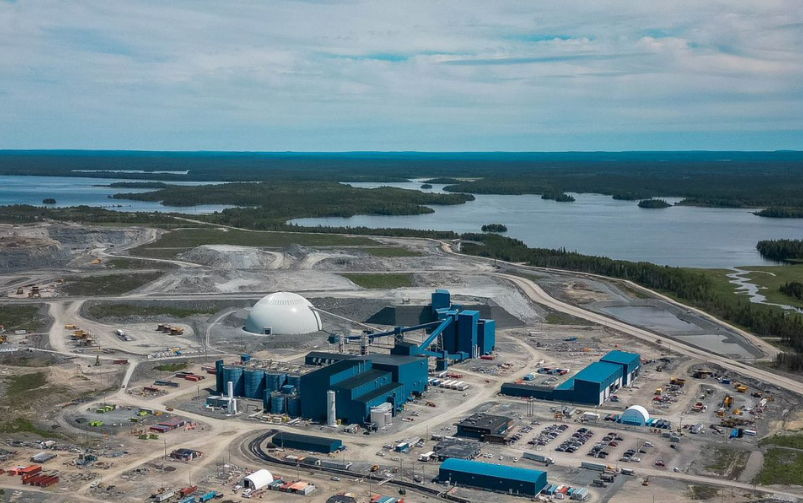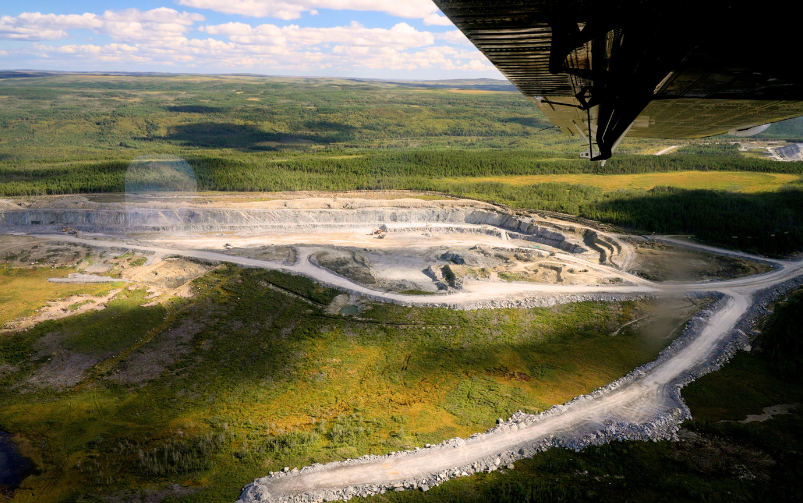An underground shot from Osisko Mining’s Windfall gold project in Quebec, which Gold Fields will wholly own once its deal to acquire Osisko Mining is approved. Courtesy of Osisko Mining.
Welcome back to your weekly mining news recap, where we catch you up on some of the news you may have missed. This week’s headlines include Western Copper and Gold extending the impact assessment timeline for its Yukon project, federal funding for a study on the health impacts of oil sands and a steelmaking slump in China.
South Africa’s Gold Fields is putting down a big chunk of change for Canada’s Osisko Mining. The all-cash deal is valued at $2.16 billion and once approved, Gold Fields will gain complete ownership of the Windfall gold project in Quebec, in which it currently holds a 50 per cent interest. The deal is expected to be completed in the fourth quarter of this year and will require at least two-thirds of Osisko Mining shareholders to vote in favour of the transaction.
Six Northern Ontario First Nations are taking the province to court over its Mining Act, claiming it infringes on their treaty and Charter rights, as reported by Northern Ontario Business. A notice of application was filed at the Ontario Superior Court of Justice on Aug. 9, with the nations arguing that the province’s online claim staking process allows anyone to stake a claim without consultation. The nations seek to have several provisions of the Act declared as unconstitutional.
It is quarterly season! Those releasing results include:
Barrick Gold
Hudbay Minerals
Wesdome Gold Mines
Imperial Metals
Orla Mining
An Ontario court has put Victoria Gold Corp. into receivership at the Yukon government’s request following a heap leach failure and significant cyanide spill at the company’s Eagle gold mine on June 24, as reported by The Globe and Mail. Accounting firm PricewaterhouseCoopers Inc. has been appointed as the receiver. The First Nation of Na-Cho Nyäk Dun has also filed for receivership of the company in Yukon court, citing severe environmental damage on its traditional lands.
The Eagle mine heap leach failure has also impacted Western Copper and Gold’s plans to submit the environmental and socio-economic effects statement for its Casino copper-gold project, which is located in west central Yukon. The company has informed the Yukon Environmental and Socio-Economic Assessment Board (YESAB) that it will delay the submission to July 2025 instead of the latter half of this year until more is learned about the impacts of the incident at the Eagle mine.
The federal government announced that it will provide $12 million over 10 years to the Fort Chipewyan Health Study, an Indigenous-led study that aims to assess potential health impacts related to oil sands development in northern Alberta, as reported by Bloomberg. Indigenous communities in the area have been advocating for a health study for decades and last year learned that tailings water had been seeping from Imperial Oil’s Kearl site into groundwater for several months.
A strike at BHP’s Escondida copper mine in Chile, the world’s largest copper mine, ended today after management and the union successfully negotiated an agreement, as reported by Reuters. The strike, which lasted three days, was announced just hours after failed negotiations between the company and the union on Aug. 13, with the union representing around 2,400 workers, who sought a bigger share of the company’s copper profits.
China’s steel industry is grappling with a crisis more severe than the downturns of 2008 and 2015, which is being attributed to a sharp drop in demand due to the country’s property slump, as reported by Bloomberg. Prices have fallen to multi-year lows, rendering steel production progressively less profitable, with steel mills having no choice but to decrease output. China’s steel exports for 2024 are expected to exceed around 100 million tonnes, which would mark the highest volume of shipments since 2016.
BHP announced its new Canada Indigenous Partnerships Plan (CIPP), which is guided by the United Nations Declaration on the Rights of Indigenous Peoples. An internal team at the company will spearhead the implementation of the CIPP at its Jansen potash project in Saskatchewan, with support from a newly established external Indigenous Advisory Circle. It will focus on several initiatives, including supporting economic reconciliation through Indigenous partnerships and employment. BHP stated that it will report on its progress annually.
Faced with the global freshwater crisis, the mining industry is starting to shift away from traditional water management to a more comprehensive water stewardship approach, as reported by Alexandra Lopez-Pacheco for the June/July issue of CIM Magazine. In the past, water management has been centred on operational efficiency, but with growing concerns about water scarcity and its effects on communities, the industry is adopting holistic strategies that aim to improve transparency on water use and take into account the needs of water users beyond mining operations.
Canada’s mining industry must empower employees to speak up about safety concerns, Shannon Walker wrote in the June/July issue of CIM Magazine. The use of comprehensive reporting tools with multiple reporting channels, such as whistleblower hotlines, which feature and preserve anonymity, are essential for fostering a speak-up culture and protecting employees’ psychological well-being.
That’s all for this week. If you’ve got feedback, you can always reach us at editor@cim.org. If you’ve got something to add, why not join the conversation on our Facebook, Twitter, LinkedIn or Instagram pages?




